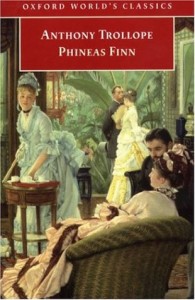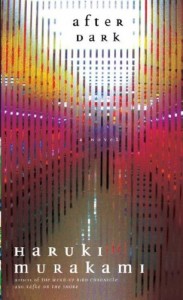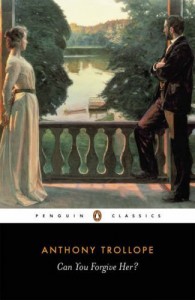Those are the ways it is similar to regular british novels of the 19th century, and those are the ways it differs from one.
It is the second in a series, so it is probably best to leave it until you have read Can You Forgive Her, although the story isn't really about the same characters (The Duke of Omnium and his clan, who are minor characters in Can You… are again minor characters in Phineas Finn) and you could probably just pick this one up. But why? If you are willing to read 600 pages of Trollope's musings on the parliaments of the 1860s, why not start at the beginning. Why are we even having this discussion. Read the first one first!
After Dark is, by my count, Haruki Murakami's eleventh novel. Of all of his novels, it covers the shortest time frame (a single night), and in fact it is among the shorter of his major works. It has a lot of trademark Murakami elements: normal people, normal japan, strange parallel universe which intrudes into their affairs. Music. Prostitution. Hotels.
I read it and I enjoyed it, and if you liked any of his other novels (except Norwegian Wood), you will probably like it too. In the weeks leading up to it, I re-read Norwegian Wood, Sputnik Sweetheart, and South of the Border, West of the Sun, and after I finished it, I re-read Wind-up Bird Chronicle, Hear the Wind Sing, Pinball 1973, Wild Sheep Chase, Hard Boiled Wonderland and the End of the World, and Dance Dance Dance. I re-read Kafka on the Shore at the end of last year, so I am reasonably current in my Murakami.
For fun, then, I give you my top Murakami novels in some semblance of order:
- A Wild Sheep Chase
- Dance Dance Dance
- Wind-Up Bird Chronicle
- Norwegian Wood
- Kafka On The Shore
- Sputnik Sweetheart
- Pinball, 1973
- After Dark
- Hear The Wind Sing
- South of the Border, West of the Sun
- Hard-Boiled Wonderland and the End of the World
You could read them in that order, of course, but I actually suggest reading them in the order 1,2,4,5,3,6,8,10,11,9,7. Hear The Wind Sing and Pinball, 1973 are very difficult to find. I won't disclose what my copy of Pinball cost me.



